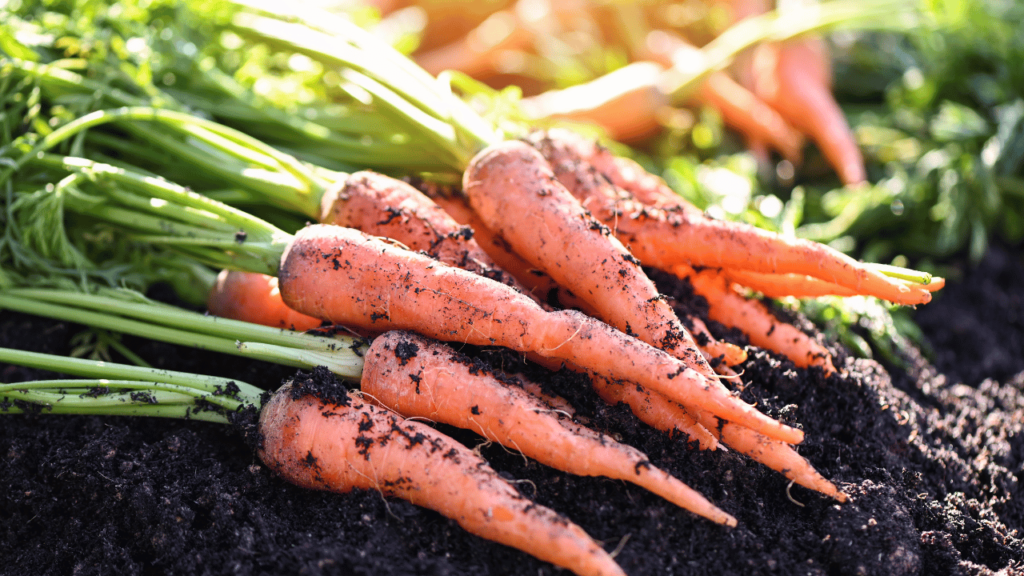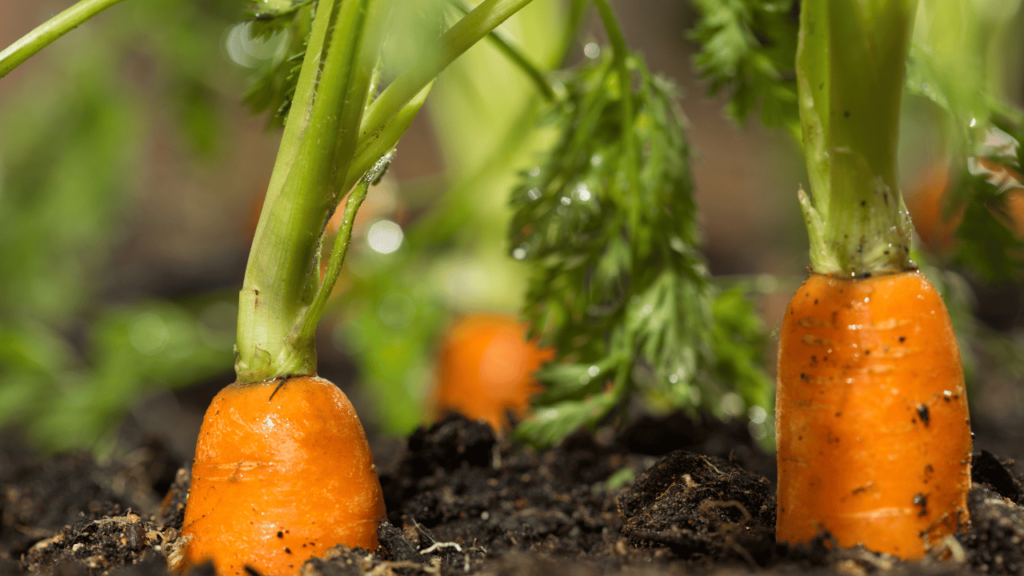Red Carrots
Red Carrots are a type of root vegetable known for their bright red color, crunchy texture, and slightly sweet taste. They are rich in vitamins, particularly vitamin A, as well as other nutrients like fiber and antioxidants. Red Carrots can be enjoyed raw as a snack or cooked in various dishes such as soups, stir-fries, or roasted. Not only are they delicious, but they also provide numerous health benefits. Carrots are a versatile and nutritious vegetable that can be enjoyed in many different ways.

How Carrot Grow?
Red Carrots grow underground as root vegetables. The carrot plant produces long, slender roots that develop into carrots. The process starts with planting carrot seeds in well-prepared soil. Small carrot plants emerge from the ground as the seeds germinate. Over time, these plants develop a thick, edible taproot that we know as carrots. The length and shape of the carrots depend on the variety and growing conditions. It’s fascinating to see how these delicious vegetables grow and develop beneath the surface.


Cultivation Of Red Carrot
Carrots are grown in many countries around the world but are particularly popular and widely cultivated in countries such as China, Russia, the United States, India, and Ukraine. These countries have favorable climates and agricultural practices that support the growth of carrots. However, carrots can be grown in various regions globally, making them a versatile and accessible vegetable enjoyed by people worldwide. Carrots are also grown in Pakistan, as the country has suitable climatic conditions for carrot cultivation. It is one of the countries where carrots are grown and enjoyed as a popular vegetable. Carrots are a versatile and nutritious crop that can be grown in various regions, including Pakistan.
Types Of Carrots
There are several different types of carrots, each with its own unique characteristics. Here are some common types of carrots:
- Nantes Carrots: Nantes carrots are known for their smooth texture and sweet flavor. They are cylindrical in shape and have a bright orange color.
- Chantenay Carrots: Chantenay carrots are shorter and broader than Nantes carrots. They have a slightly tapered shape and are known for their sweet and crisp taste.
- Imperator Carrots: Imperator carrots are longer and slender in shape. They have a deep orange color and are often used for juicing or as a raw snack.

- Baby Carrots: Baby carrots are small and tender carrots that are harvested early. They are often sold in pre-packaged bags and are popular for their convenience and sweet flavor.
- Purple Carrots: Purple carrots have a vibrant purple color on the outside and an orange core. They are known for their unique appearance and slightly earthy flavor.
These are just a few examples of the many types of carrots available. Each type has its own flavor, texture, and appearance, making carrots a versatile and enjoyable vegetable to include in your meals.
Benefits Of Carrots
Carrots have numerous health benefits. They are packed with essential vitamins and nutrients that contribute to overall well-being. Here are some benefits of red carrots:
- Rich in Vitamin A: Carrots are an excellent source of vitamin A, which is essential for good vision, a healthy immune system, and proper growth and development.
- Antioxidant Power: Carrots are rich in antioxidants, such as beta-carotene, which help protect the body against damage from harmful free radicals.
- Promote Healthy Skin: The antioxidants in carrots can help maintain healthy skin by reducing signs of aging, promoting a natural glow, and supporting skin cell regeneration.
- Supports Digestive Health: Carrots are high in dietary fiber, which aids in digestion and promotes a healthy digestive system.
- Heart Health: The potassium in carrots helps maintain healthy blood pressure levels, while the fiber content can help lower cholesterol levels, reducing the risk of heart disease.
- Weight Management: Carrots are low in calories and high in fiber, making them a great addition to a balanced diet for those looking to manage their weight.
- Oral Health: Chewing on carrots stimulates saliva production, which helps maintain oral health by reducing the risk of cavities and promoting healthy gums.
These are just a few benefits that carrots offer. Including carrots in your diet can contribute to a healthy and well-rounded lifestyle.
Dishes Of Carrot
Red Carrots are a versatile vegetable that can be used in a variety of dishes. Here are some famous dishes that feature carrots:
- Carrot Cake: A popular dessert made with grated carrots, flour, sugar, eggs, and spices like cinnamon and nutmeg. It is often topped with cream cheese frosting and enjoyed for its moist and flavorful taste.
- Carrot Soup: A comforting and nutritious dish made by blending cooked carrots with vegetable or chicken broth, onions, garlic, and spices. It can be served hot or cold and is often garnished with herbs or croutons.
- Glazed Carrots: A delicious side dish made by cooking carrots in a sweet glaze. The glaze is typically made with butter, brown sugar, and a touch of honey or maple syrup, giving the carrots a caramelized and flavorful coating.
- Carrot Salad: A refreshing and crunchy dish made with grated or thinly sliced carrots, along with ingredients like raisins, nuts, and a tangy dressing. It is a popular side dish or a light meal option.
- Carrot Juice: A healthy and refreshing beverage made by juicing fresh carrots. It is often enjoyed on its own or combined with other fruits and vegetables for added flavor and nutrients.
These are just a few examples of the famous dishes that incorporate carrots. Carrots can be used in both sweet and savory recipes, adding a vibrant color and natural sweetness to the dishes.
Side Effects Of Carrots
Carrots are generally safe to consume and have many health benefits. However, like any food, there can be some side effects if consumed in excessive amounts. Here are a few things to keep in mind:
- Carotenemia: Eating large quantities of carrots can sometimes cause a harmless condition called carotenemia, where the skin turns yellowish-orange. This usually resolves once carrot consumption is reduced.
- Digestive Issues: Eating too many carrots can lead to digestive issues such as bloating, gas, or diarrhea. Moderation is key to avoid these discomforts.
- Allergic Reactions: While rare, some individuals may be allergic to carrots. If you experience symptoms like itching, swelling, or difficulty breathing after consuming carrots, it’s best to consult a healthcare professional.
- Interference with Medications: Carrots are high in vitamin K, which can interfere with blood-thinning medications like warfarin. If you are on such medications, it’s important to consult your doctor about your carrot consumption.
Remember, these side effects are rare and usually occur with excessive carrot consumption. Enjoying carrots as part of a balanced diet is generally beneficial and poses no significant health risks.